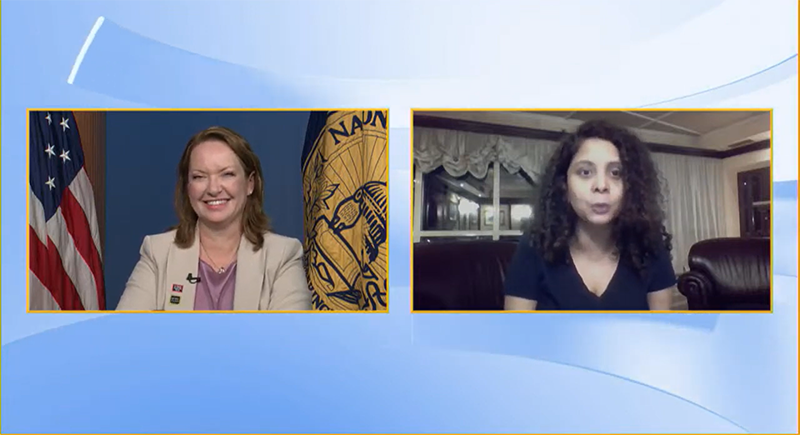India censors Muslim minority, silences free press, journalist tells Club in virtual conversation

Independent journalists in India are “putting their lives at risk” to report on the world’s largest democracy and its moves to suppress its Muslim minority and silence the free press, Rana Ayyub said during a virtual conversation with National Press Club President Eileen O’Reilly posted on May 3.
The discussion kicked off World Press Freedom Day, when new rankings that showed India slipped 11 spots to rank 161st out of 180 countries on the Press Freedom Index, published by Reporters Without Borders.
Ayyub, a Mumbai-based journalist and Washington Post Opinions contributor, described facing government intimidation, several legal challenges, travel restrictions, and a proliferation in online death threats against her and her family. Still, she persists in reporting on religious violence, extrajudicial killings by the state, and a wave of rallies held by hate groups railing against Muslims.
Reporting on the ground, Ayyub has experienced several lines of attacks against her and other Indian journalists that should worry the entire world, she said.
One comes from online-disinformation campaigns: A study of the online harassment against her concluded 8.5 million tweets have been directed at her, translating to an online attack every 14 seconds.
Another comes from the Indian government, which has been using the judicial system to harass, intimidate and imprison journalists, Ayyub said. She has been called to court on trumped-up charges and harassed at airports.
“The process is the punishment,” Ayyub said. “They keep you involved in so much paperwork, file so many cases against you, and malign your reputation” so that you are “spending more time fighting cases as opposed to doing the journalism you should be doing.”
Ayyub was granted an honorary Club membership by O’Reilly, who noted she was the first Indian and only the second non-U.S. citizen to be given such an honor.
“You feel less alone,” Ayyub said in accepting the membership. “You feel like there are people all over the world who have got your back, and you can do your journalism and you can raise your voice.”
As independent journalists live in fear, Ayyub said, the mainstream media is “captured” by the government or ignoring violence against Muslims in the country. Indian Prime Minister Narenda Modi, who took power in 2014, has yet to hold a press conference and instead stokes Hindu nationalism.
Modi’s actions as a leader of a massive and fast-growing country will have an effect on other democracies, Ayyub said. “All these populist leaders learn from each other to target journalists,” she said. “The world has a very critical role in calling out dictatorships when they see it.”
The direct effect of a hobbled free press is a perception among growing segments of the population that minority groups are to blame for problems. Ayyub said she recently attended a rally –- after dyeing her hair and giving a different name –- where participants called for a fight to keep Muslims away from their daughters and people. Attending the rally, coupled with her legal troubles and death threats, contributed to panic attacks and an extended hospital stay when her blood pressure suddenly spiked.
“Some days you feel like: 'God knows what could happen to your family members. God knows what could happen to you,’” Ayyub said. “It is a fear that I live with.”
